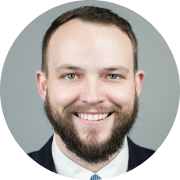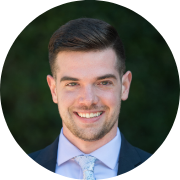

When Tyler Yount began his career, he had no idea that his path would lead him to become a project manager and earn the PMP certification. While working in Chattanooga Mayor Andy Berke’s office, a need arose for someone to lead initiatives and services that the administration wanted to deliver or adjust. Tyler is now officially the Director of Special Projects in the office and uses his PMP knowledge while tackling homelessness-related, COVID-related, and a variety of other projects.
CPE: Why did you pursue the PMP certification?
Tyler: While working for the city government, I “accidentally” became a project manager. As we began taking on more projects, there was a need for someone to monitor the projects and lead the team, and I became that person. However, I had never been formally trained on how to manage projects, so I was learning as I went. I got to a certain point where I needed something more formal, so I looked into the PMP certification. I am so glad I did because now I have a framework I can apply to standardize different projects and a pathway to learning more about specific project management areas. Before, I was making it up as I went along.
One of the other reasons I decided to get the PMP is so I could be more versatile. My previous work has either been in politics and nonprofit or in government. I wanted the flexibility of entering the private sector if I wanted to later on, although I love working in government.
C: What kind of projects do you work on as the City’s special projects manager?
T: I spend a lot of time working on homelessness-related projects. When the mayor announced that he wanted to end veteran homelessness, he assigned the initiative to me. That became a project in and of itself, and I spend about half of my time on that. The other projects I work on come out of policy research, new programs we want to start, or existing programs we want to adjust and make more efficient. I would say I usually have 4 or 5 projects open at one time. Recently, I’ve done a lot of COVID-related projects. A big project I worked on was figuring out how to open up an isolation shelter for folks who don’t have a home to isolate in if they test positive. That was a complicated project because we were figuring out requirements as we went and new information about COVID was being released daily. Risk and stakeholder management played big roles in that. I dug up my PMBOK and tried to get it all situated.
C: What goals did earning your PMP certification accomplish for you?
T: In government, you have a window of time (in my case, the term of the mayor) to get services up and running as quickly as possible. Certification helps me keep tasks on track, on budget, on time, and organized. The PMP framework and documentation also allows everyone working on projects to be on the same page and know their role. People know what to expect and when to expect it, and because of that, we can better meet the citizens’ needs we are trying to fill. My knowledge also increased significantly about projects in general. It’s like the big town hall meetings in Parks and Rec where half of the stakeholders say, “I want benches” and the other half says, “I hate benches.” I build stakeholder registers and use the analysis tools constantly to figure out who is against the project, for the project, and who my allies are. The PMP analysis tools have been extremely helpful for the “Leslie Knope” times.
C: What advice would you give to someone studying for the PMP? What are some study tips/takeaways you implemented?
T: Take the boot camp; it’s awesome! Set aside time to study. You need to be ready to budget your time in the months between the boot camp and the test. I was expecting to go to the boot camp and be ready for the test, but on day 1, our instructor said, “Content mastery does not take place solely in the classroom. You are going to have to dedicate time to studying outside of class if you want to succeed.” It seems like a big investment of time, but you do not want to have to take the test multiple times. My best advice is to try to NAIL the exam on the first try. Make the time, digest the content, and know the content like the back of your hand. Doing so will save you time in the long run.
I studied by reviewing all the topics we highlighted and talked about in boot camp. There are certain things I would go over in the book that I didn’t understand on my own, so I would bust out my notes from boot camp and study those. I would make the process and knowledge area chart every day. I suggest writing that out as well as all the formulas. I would study terms by making flash cards. On a typical study day, I would choose a knowledge area to study by going through its associated flash cards. I would read through it in the PMBOK, and then I would draw out the chart of process and knowledge areas. Practice tests are also helpful; I took 3 total.
C: On test day, when you finally hit submit and saw that you passed, how did you feel?
T: I felt awesome! It’s kind of like when you graduate and get your diploma or certificate or whatever. It’s that same feeling of being proud of yourself and your accomplishment. After, it’s time to celebrate!
C: What’s next now that you are PMP certified?
T: I really enjoy working in local government, so I can see myself continuing to do project management for the government at whatever level that may be. Or, I could go into the private sector and do something where I feel like I am helping people. Ultimately, helping others is what I want to do. I would love to jump into working with a formal PMO and seeing what that world is like.
C: Is there anything else you would like to share about your PMP experience?
T: One other thing that I really liked about the boot camp is the networking opportunities that came out of it. I see the folks I was in boot camp with at networking and PMI events all the time. The network and relationships you build are invaluable; take the class to prepare for the exam, but also do it for the great community of peers you have when the class is over.
ABOUT THE AUTHORS:

Marah Whitaker (think Laura with an M) serves as the marketing assistant for the UTC Center for Professional Education. During the workday, she spends time writing blog posts, creating content for social media, developing email campaigns, and building relationships with CPE’s customer base. During her free time, you can find her getting lost in a good book, having spontaneous dance parties, playing piano, and going to Buffalo Wild Wings on Wing Night. Professionally and personally, she aspires to live by Mr. Feeny’s advice, “Dream. Believe. Try. Do Good.” She strives to use her passions to serve others and contribute positively to the world around her.
Connect with Marah on LinkedIn.

Jeff Grant sees himself as a storyteller, and thankfully, he gets to tell some incredible stories by serving as the marketing coordinator for the UTC Center for Professional Education. During the workday, Jeff can be found implementing new marketing strategies or writing content. When Jeff is away from the office, he could be found hiking the Cumberland Trail, trying new recipes, or getting lost in a good book.
Connect with Jeff on LinkedIn.